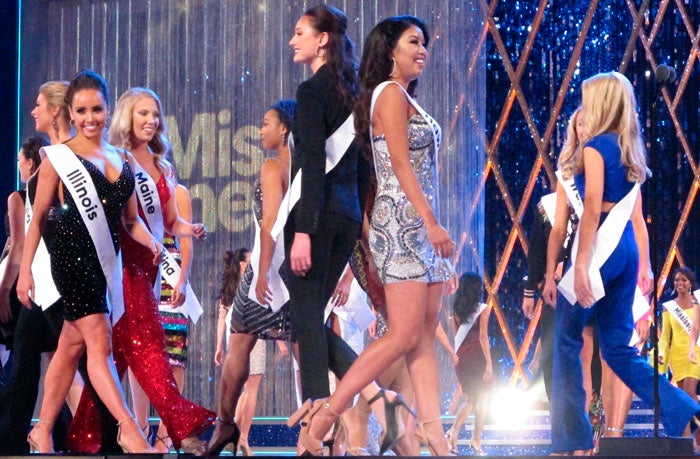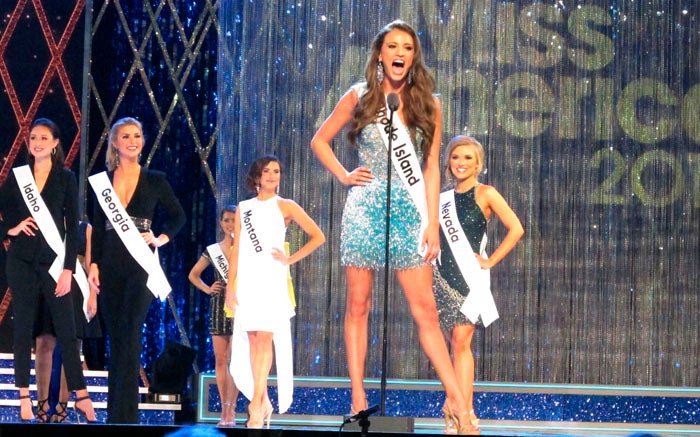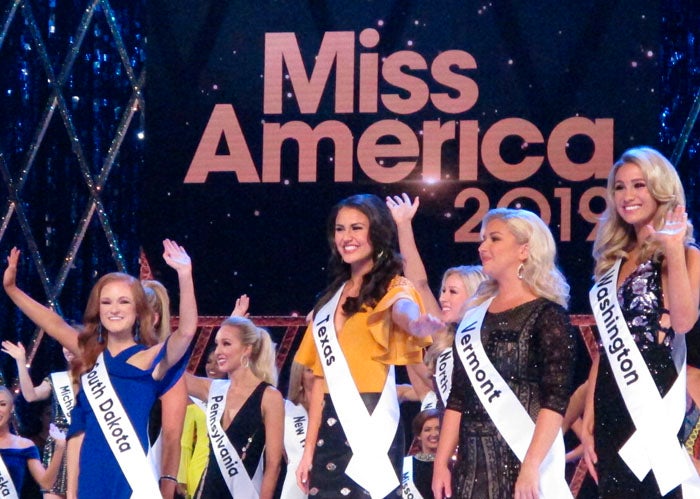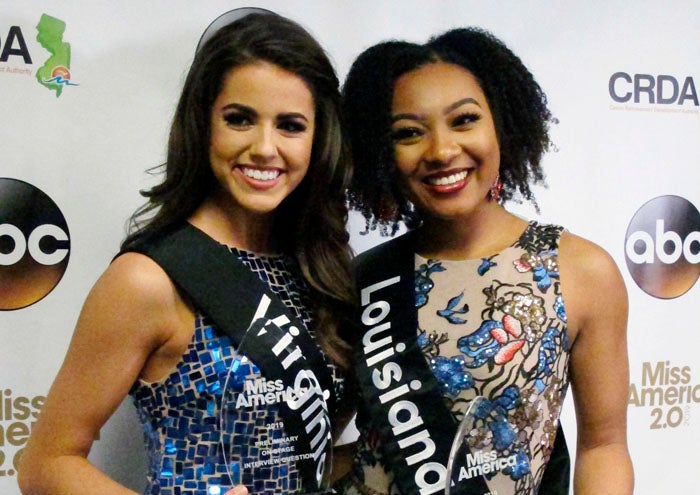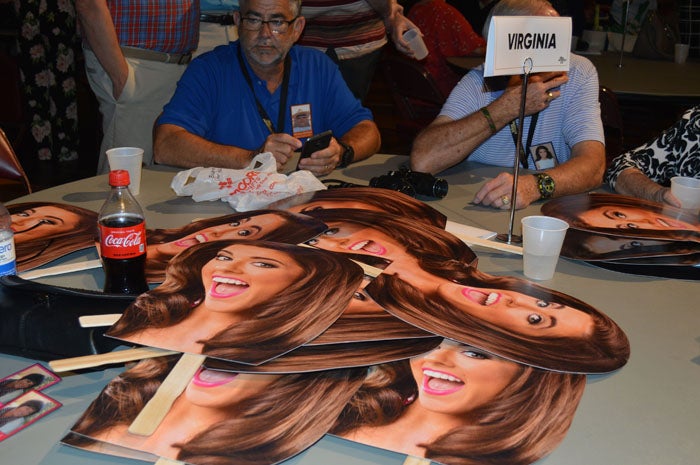There she is … for now, anyway: Stripped of bikinis, Miss America muddles through infighting
Published 12:00 am Sunday, September 9, 2018
By Amy Argetsinger
The Washington Post
ATLANTIC CITY — At the end of the day, Miss America just can’t help herself.
She may not be wearing her once-iconic swimsuit onstage. But she is still twirling through lyric dance routines to inspirational Josh Groban tunes (Miss Illinois) and rocking a black velvet cape at the classical piano keyboard (Miss Virginia).
She is still pairing precariously long gowns with treacherously high heels.
She is still promising policy solutions both bold and vague enough for an Iowa stump speech. (Miss North Carolina: “Financial literacy is a life skill I will teach not only to ensure our nation’s survival but to teach our people how to truly live!”)
And she is still, bless her, diplomatically threading the needle on the most polarizing questions of our day, in 20 seconds flat.
Hey, Miss Texas — how about those national anthem kneelers?
“I do believe that when the NFL players are kneeling, they are standing up for what they believe in,” said Madison Fuller, a kindergarten teacher from Tyler, Texas, with a talent for ventriloquism, to cheers from the Boardwalk Hall crowd Wednesday night. “However, I do think that there is an avenue to do that in a way that can promote change, tangibly, and not by doing it during a national anthem but actually providing change so that they no longer have to face this issue.”
More to the point, Miss America is still here, period; still happening.
For now, anyway.
Months of strife over an effort to overhaul and rebrand the 97-year-old pageant — notably, by eliminating its age-old swimsuit competition — has shattered the tight-knit subculture that long kept it alive. More than a dozen former Miss Americas and 46 of the state organizers who send contestants to the annual competition have called for the resignation of its new chairwoman, Gretchen Carlson, amid an exodus of board members and allegations of mismanagement.
Outrage hit a fever pitch last month when the reigning Miss America, 24-year-old Cara Mund, publicly accused Carlson and Miss America President Regina Hopper of bullying and sidelining her in her final months on the job — a soap opera played out on network morning shows, generating the most controversy (and attention of any kind) the pageant has seen in 30 years.
And yet, a rumored boycott never took hold. This year’s state winners dutifully showed up at Boardwalk Hall for their shot tonight at the timeworn title. (Tune in at 9 p.m. on WSOC.) And the disgruntled community of volunteers and superfans turned out to cheer them on.
They couldn’t not. Miss America is their thing — their gardening, their Little League coaching, their quilting, their home-brewing, their March Madness pool, their ComicCon.
Rachel Johnson, a commercial insurance agent from Chicago, signed on as a volunteer as soon as she aged out of competition and now devotes 10 to 25 unpaid hours a week to local-level “Outstanding Teen,” Miss America’s little-sister contest.
“We see so much growth and development,” said Johnson of the young women she guides along the tiara track. “They give me purpose.”
Holli’ Conway grew up an athlete, daughter of an Olympic track-and-field medalist and the furthest thing from a pageant girl, she says. But she also sang in college, and when she ended up as the entre’acte entertainment at Northwestern State University’s Lady of the Bracelet pageant — well, they sank their hooks into her pretty fast.
“They came up to me afterward and said, ‘You need to compete in a pageant,'” said Conway, who as the reigning Miss Louisiana is getting some buzz from pageant prognosticators. “I said, ‘I don’t do pageants.’ But they were persistent.”
The state and local organizers hover along the fringes here like mother hens of both sexes, hard to distinguish from the actual parents of contestants, wearing buttons or T-shirts emblazoned with their Miss State’s face. And at a time when the pageant has lost much of its cultural sway, they are among the loyalists who can still be counted on to buy tickets and fill the room.
“It takes a village to raise a child, but it takes an army to raise a Miss California,” said this year’s titleholder, Mackenzie Freed, who arrived from Lodi, California, with a small brigade of state board members, local judges and a 50-year volunteer who rode with her last weekend in the kitschy annual “Show Your Shoes” parade through the streets of Atlantic City.
From his 100-level seat near the Boardwalk Hall stage, Mansfield Bias assessed the quirks and glitches erupting on the restructured competition’s first night. In a bid to give the evening-gown preliminary competition some kind of social relevance, contestants were walking a Hollywood-style red carpet and uttering sound bites about their favored causes. But Miss Tennessee seemed hobbled, the delicate hem of her champagne-colored gown catching, static-like, on the rug.
Big problem, said Bias, executive director of the Miss Georgia program: “Today was panic city — ‘Can we sew it up? Can we put some plastic down?'”
The IT director for a concrete manufacturer, Bias got involved with local pageants 38 years ago through his work with the Columbus, Georgia, Jaycees. He was the father of sons, no daughters, but something about it touched him — the charm-school role it played for small-town girls honing their ambition.
“To see them come back year after year, and to see them grow, and they’re taking their LSATs and going on job interviews — that’s why you do it year after year.”
One of Miss America’s most loyal stalwarts, Bias has also been one of the most outspoken critics of Carlson, the former Fox News host and Miss America 1989 who took over the pageant in January after the ouster of longtime chief executive Sam Haskell over leaked emails in which he disparaged several former Miss Americas.
Bias and many of his fellow state directors had grudgingly gone along with the decision to drop swimsuits — a headline-making announcement in June that Carlson said was about women’s empowerment and inclusion. Later, though, they felt misled by the reasons for the change, claiming that pageant brass had falsely led them to believe that no TV network in the #MeToo era would air the pageant with its old scholarships-and-bikinis formula.
The dispute has made the climate toxic, with Carlson blasting her critics as resistant to change and guerrilla signs going up around town calling Carlson “So Fake.” Now, conspiracy theories are flying that the Miss America Organization plans an overhaul that would cut state organizers out of the equation with a system of regional candidates. (A letter from Carlson promising that state directors seeking her resignation would see “no immediate license termination” did little to calm those fears.)
So here’s what the rebranded pageant looks like. The traditional runway is gone. The sashes are black with white letters, which looks funereal to some but clean and modern to others. The TV commercials are glitz-free — no waving from stages, just some earnest chitchat in close-up that feel like a pharma ad or a promo for a new MSNBC host.
And emblazoned on the stage backdrop are words such as “fearless,” “role model,” “intelligent,” “strong,” looking like the notes from a branding brainstorm.
The title of “Miss” seems to be missing from just about everything except the brand name, candidates called to the stage by their state, which has a curt, jaunty sound, like prep-school boys calling each other by their last names.
“Maine,” said Jackie Mayer, Miss America 1963, “what would you like to tell America?”
“Every minute in the United States, 20 people fall victim to domestic violence,” replied Olivia Mayo.
Mund appeared onstage during the preliminaries and gave a pleasant little speech, as if everything were normal. Carlson was conspicuously invisible.
And of course, there was no swimsuit competition. In its place was an interview session, in which contestants answered questions, pop-quiz style, about their opinions on current events — the kind of talky stuff that has always truly determined who will be Miss America in backstage judging.
Which is fine by many of the Miss States, who speak positively about the pageant’s new look. “What we put on the stage in the past hasn’t always been a good representation of why we choose the women we choose for Miss America,” said Freed.
But it left some of the superfans a little cold.
“It’s very different without swimsuit,” said Marylou Cooke of Staten Island, a veteran of some 30 Miss America crownings. “It seems strange not to see it.”
“Aw, big-time strange,” agreed Anthony Scuteri, another longtime pageant hand with the Miss New York system.
Backstage, though, the contestants profess to being unaffected by the turmoil of the past year.
“I think it is a mix of disheartening and exciting,” says Miss Virginia, Emili Elizabeth McPhail, a recent Hollins graduate, maintaining excellent eye contact while holding forth about the challenges for institutions undergoing change.
“The states are standing up for what they believe in. Cara Mund is standing up for what she believes in,” McPhail adds. “I am proud to be part of a group of people who are trying to do the right thing.”
It’s a very good answer. Keep an eye on her.


